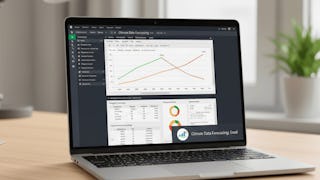By the end of this course, learners will be able to define the fundamentals of forecasting, classify forecasting methods, apply regression and decomposition techniques, and implement advanced models like ARIMA and SARIMA to accurately predict time-dependent data.
您将学到什么
Define forecasting fundamentals and classify methods for time-dependent data.
Apply regression, decomposition, and exponential smoothing in R.
Implement ARIMA and SARIMA models with ACF/PACF diagnostics for accuracy.
您将获得的技能
要了解的详细信息

添加到您的领英档案
September 2025
11 项作业
了解顶级公司的员工如何掌握热门技能

该课程共有3个模块
This module introduces learners to the fundamental principles of forecasting within the field of business analytics. It explains the purpose and scope of forecasting, explores different forecasting methods, and highlights common challenges businesses face when predicting future trends. Learners will also gain practical insights into simple forecasting approaches, transformations, and accuracy evaluation techniques, building a strong foundation for advanced forecasting models.
涵盖的内容
12个视频4个作业
This module explores how regression techniques and decomposition methods can be applied to time series forecasting. Learners will gain an in-depth understanding of simple, multiple, and non-linear regression, the use of predictors and lagged variables, and the unique considerations of time series regression. The module also introduces decomposition approaches to separate time series into trend, seasonal, cyclical, and irregular components, helping learners build accurate and interpretable forecasting models in R.
涵盖的内容
12个视频4个作业
This module focuses on advanced time series forecasting techniques, including exponential smoothing, ARIMA, and Seasonal ARIMA models. Learners will explore the theoretical foundations and practical applications of autoregressive and moving average models, understand the role of ACF and PACF in model selection, and learn how to handle seasonal and non-seasonal time series data. By mastering these advanced methods, learners will be able to build robust and accurate forecasting models in R that address both short-term fluctuations and long-term seasonal trends.
涵盖的内容
8个视频3个作业
从 Data Analysis 浏览更多内容
人们为什么选择 Coursera 来帮助自己实现职业发展




常见问题
To access the course materials, assignments and to earn a Certificate, you will need to purchase the Certificate experience when you enroll in a course. You can try a Free Trial instead, or apply for Financial Aid. The course may offer 'Full Course, No Certificate' instead. This option lets you see all course materials, submit required assessments, and get a final grade. This also means that you will not be able to purchase a Certificate experience.
When you purchase a Certificate you get access to all course materials, including graded assignments. Upon completing the course, your electronic Certificate will be added to your Accomplishments page - from there, you can print your Certificate or add it to your LinkedIn profile.
Yes. In select learning programs, you can apply for financial aid or a scholarship if you can’t afford the enrollment fee. If fin aid or scholarship is available for your learning program selection, you’ll find a link to apply on the description page.
更多问题
提供助学金,










